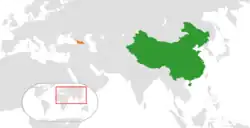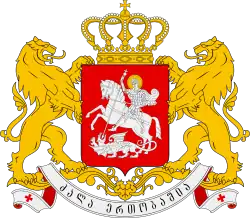China–Georgia relations
Diplomatic relations between the People's Republic of China and Georgia were established on 9 June 1992. Since then, bilateral ties have advanced gradually and mostly focused on economic cooperation. China has an embassy in Tbilisi, and Georgia has an embassy in Beijing. By 2017, China had become Georgia's fourth largest trading partner and the second largest exporting market for Georgian wine.[1] China has been appreciative of Georgia's commitment to One-China policy and has in turn respected Georgia's territorial integrity by refusing to recognize the Russian-backed separatist regions of Abkhazia and South Ossetia. Georgia, for its part, has been increasingly attractive for China as a transportation hub and one of the shortest routes for Chinese goods on their way to the European Union.[2]
 | |
China |
Georgia |
|---|---|
History
The Yuan Shi, the official history of the Yuan dynasty of China, records the fate of Georgia in 1252. In that year, the Mongol khagan Möngke, who was expanding into China, granted the Kingdom of Georgia, which was then under Mongol control, to Berke. Chu'ü-erh-chih ([tɕʰỳ ǎɚʈʂɻ̩ɨ̀]; Chinese: 曲兒只), the Chinese name used for Georgia in the Yuan Shi, is etymologically the same as "Georgia".[3][4]
Political ties
The China–Georgia relations were officially established on 9 June 1992, when China extended its diplomatic recognition to the Republic of Georgia after the dissolution of the Soviet Union.[5] Eduard Shevardnadze, then Georgia's head of state, paid a state visit to China in June 1993[6] and signed several agreements, principally on economic and trade cooperation. Mikheil Saakashvili, the then-President of Georgia, was in China on an official visit in April 2006.[7]
The two countries maintained communication and coordination at the United Nations and other international organizations. Georgia has maintained its "one-China policy"[8] and does not recognize Taiwan. In its turn, China, member of the Shanghai Cooperation Organisation (SCO), refused to follow the suit of Russia, a fellow SCO member, in recognition of the independence of Georgia's breakaway Abkhazia and South Ossetia in the aftermath of the August 2008 Russo–Georgian War despite the appeal by the Russian Foreign Ministry. Instead, the SCO issued the Dushanbe Declaration, calling on all parties to solve the "existing problems" through diplomacy.[5] Similarly, a Chinese Foreign Ministry spokesman expressed the agency's concern due to the "latest development in South Ossetia and Abkhazia", responding to a journalist's question regarding China's position on Russia's recognition of the disputed territories.[5] In the view of the political analyst Joseph Larsen, "while China does not present an alternative to NATO and EU integration... relations with China have the potential to complement Georgia's existing foreign policy."[9]
Economic ties
Bilateral economic ties have gradually expanded since 1992 and witnessed further growth beginning in 2010 as Georgia's economy recovered from the 2008 war. China views Georgia as part of the One Belt One Road Initiative, a project it launched in 2013 to "shorten the distance between China and Europe" through improved infrastructure connections.[9][10] By 2014, China had accounted for $217.94 million in foreign direct investment in Georgia, putting it in fourth place after Azerbaijan, the Netherlands, and the United States.[5]
A number of Chinese companies have launched major operations in Georgia. China's Hualing Group, mainly focused on construction and management of hotels and trade centers, was Georgia's single largest foreign investor as of 2017. Some of the company's projects in Georgia include the Hualinge Hualing Free Industrial Zone[11]: 111 in Kutaisi, Georgia's second largest city. The Hualinge Hualing Free Industrial zone is an important hub for Chinese manufacturers to access the European market.[11]: 111 Hualing Group has also built a large residential and commercial complex in a suburb of the capital city of Tbilisi.
In January 2017, the CEFC China Energy agreed to purchase 75% of shares in the Free Industrial Zone at Poti on Georgia's Black Sea coastline. Georgia's main export product to China is wine, which amounted to 5,299,820 bottles in 2016, nearly double the amount exported in the previous year.[12] In addition to wine, other significant exports from Georgia to China include copper ore and copper products.[11]: 111 Significant Chinese exports to Georgia include mechanical products, electrical products, and steel.[11]: 111
On 13 May 2017, Georgia and China signed a Free Trade Agreement.[13]
References
- "China-Georgia Friendship Celebrates the 25th Anniversary of Diplomatic Relations". Georgia Today. 13 June 2017. Retrieved 28 November 2017.
- Emil Avdaliani. The Middle Corridor and China’s reorientation of Eurasian trade, July 4, 2023
- Thomas T. Allsen, Culture and Conquest in Mongol Eurasia (Cambridge University Press, 2001), p. 54.
- Toqto'a, History of Yuan, scroll 3. "海都於海押立地,別兒哥於曲兒只地,脫脫於葉密立地"
- Larsen, Joseph (October 2017). "Georgia-China Relations: the Geopolitics of the Belt And Road" (PDF). Tbilisi: Georgian Institute of Politics.
{{cite journal}}: Cite journal requires|journal=(help) - Mackerras, Colin (2001). The New Cambridge Handbook of Contemporary China. Cambridge University Press. p. 48. ISBN 0521786746.
- "Bilateral Relations between Georgia and the People's Republic of China". Ministry of Foreign Affairs of Georgia. Archived from the original on 1 December 2017. Retrieved 28 November 2017.
- "China and Georgia". Ministry of Foreign Affairs of the People's Republic of China. Retrieved 28 November 2017.
- Larsen, Joseph (12 October 2017). "Commentary: Georgia-China relations are about more than economics". Civil Georgia. Retrieved 28 November 2017.
- "Georgian PM: "Today Georgia-China relations are stronger than ever"". Agenda.ge. 9 June 2017. Retrieved 28 November 2017.
- Sahakyan, Mher (2023). "China and the South Caucasus in a Multipolar World Order 2.0". China and Eurasian Powers in a Multipolar World Order 2.0: Security, Diplomacy, Economy and Cyberspace. Mher Sahakyan. New York: Routledge. ISBN 978-1-003-35258-7. OCLC 1353290533.
- Larsen, Joseph (3 May 2017). "Georgia: The Black Sea Hub for China's 'Belt and Road'". The Diplomat. Retrieved 28 November 2017.
- "Georgia, China sign historic Free Trade Agreement". Agenda.ge. 28 November 2017. Retrieved 14 May 2017.
